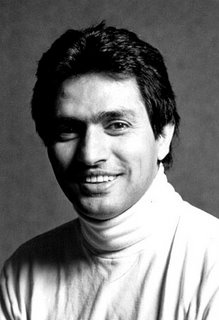May 12, 2006 Friday
Wolfgan Amadeus Mozart Symphony No. 40 in G. minor
Reza Vali The Being of Love
Ms. DeYoung Mezzo-Soprano
Intermission
Peter Tchaikovsky Symphony No. 5 in E minor
Conducted by Manfred Honeck
 On the night of world premier of Iranian composer Reza Vali’s “The Being of Love”, Heinz Hall was only half filled. It’s a fact that most subscribers are cautious about modern pieces, not to mention that work is originated from Iran’s folk songs. Aaron Copland once said that composing is not a happy art. “The composer depends on someone else to perform. If he can’t get anyone to play his work, he might just as well have not written it. The country is filled with sad and lonely figures walking around with unperformed music in their pockets.” In this sense, Vali is lucky.
On the night of world premier of Iranian composer Reza Vali’s “The Being of Love”, Heinz Hall was only half filled. It’s a fact that most subscribers are cautious about modern pieces, not to mention that work is originated from Iran’s folk songs. Aaron Copland once said that composing is not a happy art. “The composer depends on someone else to perform. If he can’t get anyone to play his work, he might just as well have not written it. The country is filled with sad and lonely figures walking around with unperformed music in their pockets.” In this sense, Vali is lucky.
In China, music critics used to say “越是民族的,越是世界的”, which can be translated into English as “the more true the music is to its cultural root, the greater potential for universal acceptance”. I partially agree with it with discretion. If so, Peking Opera, which is facing fast dwindling domestic audience, should have acclaimed Vienna golden Music Hall already. In fact, a composer is a universe of his own. He has to speak of his own language based on his cultural environment and educational background. Tan Dun traces back his special experience of working for an opera troupe during Cultural Revolution and clashes it with modern music. Vali explores his cultural heritage in the frame of more traditional western system. But to modulate oriental style into western diatonic scale without losing its authenticity is a paramount job. Tan Dun succeeded with exploring the infinity of quasi-percussion style of Chinese music in the context of modern atonality and sound texture. The premiere of The Being of Love showed that Vali cleverly avoided Persian system by adapting more flexible folk songs as his musical elements.
Born in Ghazvin, Iran, Reza Vali, who began collecting folk songs as well as Beetle’s at the age of 14, began his formal musical studies at Conservatory of Music in Teheran. He moved to the capital of classical music – Vienna later, where he traversed music journey from a huge time span. “I was in a concert of Bruckner by Karajan. It was great.” However, Mahler, he confessed, is his favorite composer. Vali moved to Pittsburgh for Ph.D. study when steel mills were still dominating scenes in the city. Now he is a faculty member at Carnegie Mellon University and lives with his big family.
In 1999, Vali made his first visit back to Iran over more than 20 years. It was a fruitful trip in that he brought back a whole suitcase of audiotapes and booklets, all of which were related to folk songs. The premiered work, commissioned by PSO two years ago, was one of his many exploration of those songs obtained from his trip.
I always appreciate the tutorial offered by PSO one hour before the concert. But for such a unique world-premier work, a tutorial featuring composer himself was essential. Modern music is difficult not only because it has recondite melodies and free form devoid of repetition, but also because it comes from a lack of comprehension of the way in which the music is put together. During the pre-concert tutorial, several original Persian folk songs were played. It reminded me immediately of the movie “Prisoner of the Mountains”. (In fact geographically there is some similarity between Chechnya and Iran.) The melodies are picturesquely expansive with prime simplicity, climbing up and down freely. However, the elongated syllables of words keep trembling repeatedly between adjacent notes (with surprising modulation), therefore propel the free-paced songs with energy and dynamics. It sounds remote and close at the same time, as if contradictorily it originates from mountains faraway but lingers just ten feet above. Vali borrowed the idesa from Bartok and divided his song-cycle into two categories, “imaginary” and “authentic”. However, no matter whether or not the melodies were created by composer himself, he completely changed the format, composition and color of those folk songs. It possesses more forms from western orchestra works with only folk song elements and poem stanza remained.
In fact, one can sense the influence of western music on the work without much difficulty. Similar to Mahler’s “Das Lied von der Erde”, the work also has five movements and is centered on the last one. The last movement, which gives the set the title, is the musical and philosophical culmination of theme. In Mahler’s “Fareware”, every time the return of the theme sang by woodwind section builds up the dark and mysterious atmosphere followed by the parting from soprano. Here, in the last movement of “The Being of Love”, Vali takes full advantage of percussion instruments so that greater and greater momentums are stacked to the final climax. Then with such great energy suddenly to release, the mezzo-soprano sings the ecstasy of love by surmounting the whole orchestra.
The serene fourth movement has delicate small chamber ensemble-styled sections, which are not uncommon in Bruckner’s symphonies. The movement is highlighted by a wind chime in E Minor which was specially made for this work from a company in Montana. The quiet atmosphere comes from space of silence between notes, a feature common in oriental music. But Vali also quoted from Wagner and Messiaen to accompany Persian stanza in order to reflect the sensual aspect of love. One of the audiences asked how Wagner’s work, like “Tristan Und Isolde” influenced on his work. He answered that in Wagner the ultimate destination or outlet of love is extinction, rooted from Schopenhauer; while Rumi, the great Persian Sufi poet whose poem he used for the last movement, states love has the power to move the mountain, therefore provides an opposite explanation of love in his new work.
It was amazing for Michelle DeYoung to sing the love song cycle in Persian. DeYoung’s voice has penetrating power that could surmount the orchestra. She is a Wagnerian singer, which based on Vali’s intention can reflect how westerners see love. Although I doubt that no more than 5% of the audience could understand the lyrics, Ms. DeYoung expressed what she felt from the poems in her voice. She smiled most of the time as if she were blessed and falling in love with the work.
DeYoung’s voice has penetrating power that could surmount the orchestra. She is a Wagnerian singer, which based on Vali’s intention can reflect how westerners see love. Although I doubt that no more than 5% of the audience could understand the lyrics, Ms. DeYoung expressed what she felt from the poems in her voice. She smiled most of the time as if she were blessed and falling in love with the work.
------------------------------------------------------------------------
It was also Austrian conductor Manfred Honeck’s debut in Pittsburgh. He conducted both Mozart and Tchaikovsky without score. Under his baton, Mozart’s G Minor symphony was balanced but dramatic although the tempo he chose tended to be on the brighter (lighter) side. His Tchaikovsky was under deep consideration. There was magic chemistry with the orchestra. Michael Rusinek explored the gloomy murky psychological effect with lower register of his clarinet; while playing in high register, he played such a sheer beauty with a sense of uneasiness. William Caballero sang the tender melody in the second movement like submissive sighs. I was probably not the only person who was touched by his solo with tears. The transition from reticent croon to sudden hysteria burst-out from the orchestra was harsh and crude with no mercy. It was these seemed-to-be repellent and exaggerated sections that made Tchaikovsky’s music unique. I, standing there to gave long ovation to Mr. Honeck’s debut, began to wonder what the orchestra would sound when legendary Dohnányi come to conduct Tchaikovsky’s No. 6 symphony next week. (Unfortunately, I will never know, since I have to leave out of town for a conference.)
The Being of Love
Rumi
The Being of Love,
Is separate from any existence,
Love is the mystery
of God’s creation.
Through love,
The soul of the earth
reached the depth of the universe.
Mountains arose,
moving to an ecstatic, celestial dance.

1 comment:
Very interesting to read your blog and the reviews of all our recent performances!
You write insightfully and seem to pick up on a lot of the 'between the lines' elements of the concert-experience. Fascinating!
Glad you enjoyed the Vali premiere - we were all totally bowled over by how enjoyable and accessible a piece it turned out to be.
Hopefully see you at the symphony sometime soon...
Post a Comment